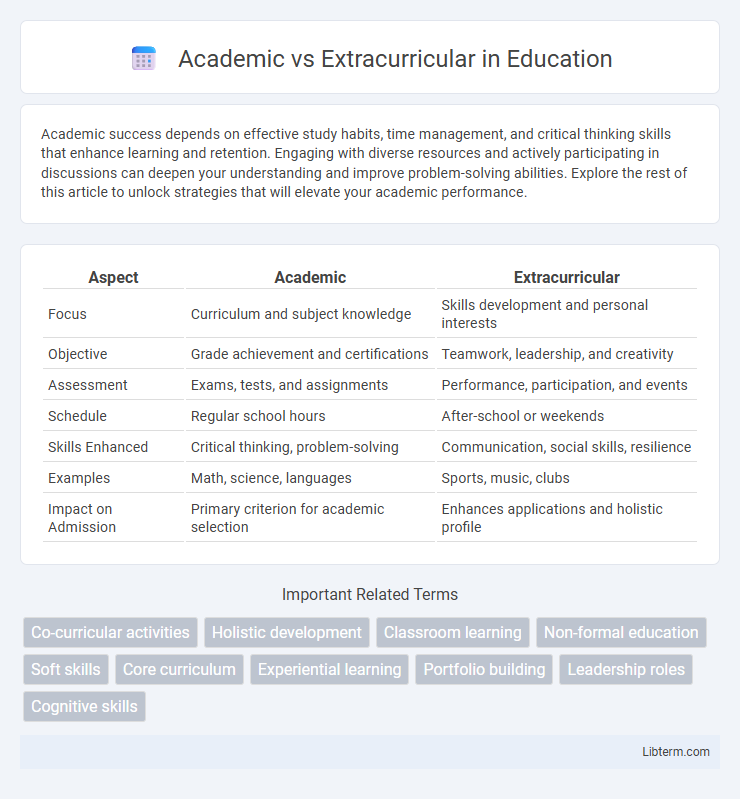Academic success depends on effective study habits, time management, and critical thinking skills that enhance learning and retention. Engaging with diverse resources and actively participating in discussions can deepen your understanding and improve problem-solving abilities. Explore the rest of this article to unlock strategies that will elevate your academic performance.
Table of Comparison
| Aspect | Academic | Extracurricular |
|---|---|---|
| Focus | Curriculum and subject knowledge | Skills development and personal interests |
| Objective | Grade achievement and certifications | Teamwork, leadership, and creativity |
| Assessment | Exams, tests, and assignments | Performance, participation, and events |
| Schedule | Regular school hours | After-school or weekends |
| Skills Enhanced | Critical thinking, problem-solving | Communication, social skills, resilience |
| Examples | Math, science, languages | Sports, music, clubs |
| Impact on Admission | Primary criterion for academic selection | Enhances applications and holistic profile |
Understanding Academic Activities
Academic activities involve structured learning experiences such as lectures, research projects, exams, and coursework that develop knowledge and critical thinking skills. These activities emphasize mastery of subject matter, intellectual growth, and assessment through grades or evaluations. Understanding academic activities is essential for academic success, as they form the foundation for gaining expertise and achieving educational objectives.
Defining Extracurricular Activities
Extracurricular activities encompass organized pursuits outside the standard academic curriculum, including sports, clubs, volunteer work, and arts programs, that foster personal growth and social skills. These activities contribute to holistic development by enhancing teamwork, leadership, and time management abilities beyond textbook learning. Participation in extracurriculars often correlates with improved college admissions prospects and well-rounded resumes.
Key Differences Between Academics and Extracurriculars
Academics emphasize formal education, structured learning, and mastery of subjects through classroom instruction, exams, and assignments, focusing on intellectual development and knowledge acquisition. Extracurriculars involve activities outside the standard curriculum, such as sports, clubs, arts, and volunteer work, promoting social skills, leadership, and personal growth. The key difference lies in academics prioritizing cognitive achievement and standardized assessment, while extracurriculars enhance practical skills, teamwork, and holistic development.
Importance of Academic Excellence
Academic excellence remains the cornerstone for long-term career success and intellectual growth, providing essential knowledge and critical thinking skills that extracurricular activities alone cannot fully develop. Mastery in core subjects like mathematics, science, and language arts lays a strong foundation for specialized fields and higher education opportunities. Educational institutions prioritize academic performance when awarding scholarships and admission, highlighting its crucial role in shaping future prospects.
Value of Extracurricular Participation
Extracurricular participation enhances essential life skills such as teamwork, leadership, and time management, complementing academic knowledge. Studies show students engaged in extracurricular activities often exhibit higher levels of motivation, social competence, and resilience. Employers and universities increasingly value diverse experiences that demonstrate practical abilities beyond traditional academic performance.
Impact on College Admissions
Academic achievements remain the primary focus for college admissions, with GPA, standardized test scores, and rigorous coursework playing a critical role in acceptance decisions. Extracurricular activities contribute significantly by showcasing leadership skills, commitment, and unique talents that differentiate applicants in competitive pools. Admissions officers seek a balance, valuing how extracurricular involvement complements strong academics to highlight a well-rounded and engaged student.
Skills Gained from Academic Pursuits
Academic pursuits develop critical thinking, analytical reasoning, and research skills essential for problem-solving across various disciplines. Mastery of subject-specific knowledge and effective communication techniques enhances cognitive abilities and prepares students for professional challenges. These rigorous intellectual activities foster discipline, time management, and a lifelong commitment to learning.
Personal Development Through Extracurriculars
Extracurricular activities significantly enhance personal development by fostering skills such as leadership, teamwork, and time management beyond the academic curriculum. Participation in sports, clubs, and volunteer work cultivates social competence and emotional intelligence, which are essential for holistic growth. Engaging in diverse extracurricular experiences prepares individuals for real-world challenges by promoting self-discipline and resilience.
Achieving a Balanced Student Life
Achieving a balanced student life requires equal attention to academic excellence and extracurricular involvement, as both contribute to personal growth and skill development. Academic success builds critical thinking and knowledge acquisition, while extracurricular activities foster teamwork, leadership, and time management skills. Striking a balance between coursework and hobbies enhances overall well-being and prepares students for diverse real-world challenges.
Tips for Managing Academics and Extracurriculars
Balancing academics and extracurriculars requires effective time management strategies such as creating a detailed weekly schedule that allocates specific hours for study and activities to prevent overlap and burnout. Prioritizing tasks based on deadlines and importance helps maintain academic performance while allowing participation in clubs, sports, or volunteer work. Regular self-assessment and flexibility to adjust commitments ensure sustained productivity and personal growth in both areas.
Academic Infographic

 libterm.com
libterm.com